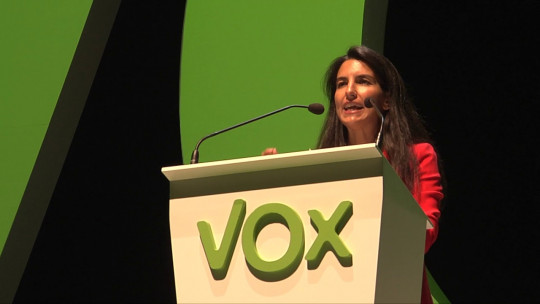
Vox Three letters, one word, one monosyllable. From the Latin “voice”. It is the phenomenon that is fashionable.
Catch all the big headlines from digital and traditional newspapers. It is on everyone’s lips; at family gatherings, at friends dinners. The national news programs open daily with some news regarding the controversial political formation that has stridently burst into the Andalusian Parliament, following the regional elections held on December 2, 2018. Never before have three letters had so many interpretations and debates. But, Is it correct to classify it as a fascist party?
The party is led by Santiago Abascal Conde (Bilbao, 1976), a former member of the Basque Popular Party, once called “the party of the brave,” given the dark circumstances that occurred in that Spanish region during the eighties until well into the new millennium, where The terrorist group Euskadi Ta Askatasuna (ETA) attacked, kidnapped and murdered politicians and civilians opposed to their struggle and ideology, with a special focus on the PPV. And although Vox is the surprise today, it is not a new party, but it was founded five years ago.

Vox, from ostracism to media stardom
As we have explained in the introductory paragraphs, Abascal’s formation is not a creation of the day before yesterday, but he has already been in Spanish extra-parliamentary activity for five years, not in the media, a fact to take into account. Vox was established as a political party and registered with the Ministry of the Interior in 2014, the result of a split from the center-right party “Popular Party”, whose former members saw their basic principles betrayed by the then President of the Government of Spain, Don Mariano Rajoy Brey.
His first years were complicated and involved in controversy from the beginning. Criticism of political correctness, meetings with the French National Front or the informal support of religious platforms such as Make yourself heardinitially assumed poor acceptance by their fellow citizens and political analysts.
The images of its members with loudspeakers in hand perched on a wooden stool like an evangelical preacher did not predict a good future for them Their persistence, tenacity and conviction have brought them good results and their speech is debated daily on all television sets.
A fascist party of the 21st century?
There are infinite columnists, opinionologists and political scientists who have been quick to attach this label to the party that has achieved an unexpected result, by obtaining 12 seats in the Parliament of the Junta de Andalucía. Their communication mechanisms, disruptive speeches, high-sounding words and staging have earned them that categorization. But is Vox really a fascist party? Let’s analyze some data.
According to political science -political science-, Fascism is an ideology of exaltation of the leader, a discourse of constant appeal to the representation of the people (in these cases neglected), an authoritarian and, above all, undemocratic vision of what power is, whose media and public opinion are controlled by the government that the people have handed over to it. Giving up freedom in exchange for security and stability, as happened in Europe in the 1920s and 1930s. The authorship of this ideology corresponds to Benito Mussolini, a thought that took place during the period of the two World Wars of the 20th century.
For the vast majority of the Spanish media, Vox meets the basic requirements to define this formation as fascist. Some experts on the subject from the Complutense University of Madrid and the Autonomous University of Barcelona have no doubt. The authors base themselves, among other points, on the support that it received in its beginnings, and that it continues to receive at the present: Marine Le Pen and some members of the Francisco Franco National Foundation They publicly showed their joy for the results achieved on December 2, 2018.
However, another reference in political analysis and a doctor in Political Science from the Autonomous University of Madrid, Jorge Verstrynge, assured in the microphones of A3 Media that “Vox has nothing of that. I tell you, I was a real fascist. “These people have stood for democratic elections, which breaks with the essential element of fascism.” Íñigo Errejón, founder and Secretary of Analysis and Political Change of the social democratic party Podemos, was more ironic: “400,000 fascists have not voted for Vox”
The antecedent of Podemos
Is Vox a fascist party? This party has earned some enmity among public opinion for supporting some of the most controversial points of its electoral program, such as the repeal of the Comprehensive Law on Gender Violence, the recentralization of the Public Administration, the defense – not by law – of the traditional family and the Judeo-Christian cultural values that constituted modern Spain.
But is this fascism, or does it correspond to a media strategy to demonize Abascal’s party? There is a similar precedent, also not far away, from the party that obtained unexpected success five years ago in the 2014 European Elections, and which is on the opposite axis of the political spectrum to Vox: Can. Since Constitutional Spain, political activity and governance resided in the so-called “alternation” of the two-party system formed by the right (Popular Party) and the left (Spanish Socialist Workers Party).
Thus, Podemos’ links with communism and Chavismo, which existed and exist, served to polarize public opinion and portray Podemos as a communist party, without further ado, despite the fact that it did not comply with any of the typical characteristics of communist parties (starting by setting the collectivization of the means of production as one of its main objectives).
Something very similar happens with Vox, which, although it openly expresses ideas that the political left calls antidemocratic, such as discrimination against homosexuals (it proposes withdrawing their right to marry, with all the legal impediments that this generates), or well the possible support from Francoist sectors, it is not a fascist party. It neither justifies the use of violence above the law, nor does it attempt to mobilize civilians to support the party through control of the territory, nor does it manifest worship of the leader.








